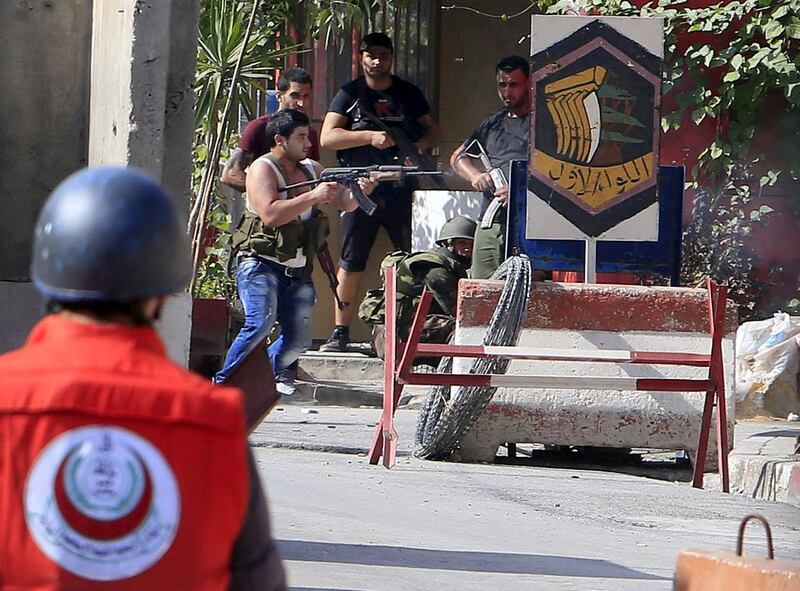Sidon, Lebanon // Fighting between rival armed groups in Lebanon’s largest Palestinian camp killed three people on Tuesday and forced hundreds of residents to flee.
The fighting in the Ain Al Helweh camp near the southern port city of Sidon began on Saturday following a failed assassination attempt on an official of Palestinian president Mahmoud Abbas’s Fatah movement.
Ashraf Dabbour, the Palestinian ambassador to Lebanon, told Beirut-based Al Mayadeen TV that a ceasefire agreement was reached late on Monday, but clashes erupted again on Tuesday.
Mr Dabbour said extremist militants were trying to seize control of the camp. “What is going on in the camp is part of what is happening in the region,” he said, referring to the rise of extremist militant groups in neighbouring Syria and the region.
Rockets and heavy machine guns were used in the clashes, causing serious damage to homes, Lebanese security officials said.
At least two of the dead were Fatah members, one of them an officer, Palestinian sources said. The identity of the third person was unclear.
At least 35 people were wounded, but ambulances unable to enter the camp to collect more injured because of the intensity of the clashes, medics said.
The Lebanese army reinforced its positions at the four main entrances to the camp and soldiers allowed people to leave, but stopped anyone from entering.
By long-standing convention, the army does not enter Palestinian refugee camps in Lebanon, leaving the factions themselves to handle security.
Hundreds of residents fled the camp to take shelter in nearby mosques. About 900 gathered at one mosque, many of them Palestinians displaced by the war in Syria.
“I regret leaving Syria,” said a man who gave his name as Abu Khaled, originally from the Yarmuk refugee camp on the outskirts of Damascus. “I could have taken refuge in Damascus instead of in a war zone like Ain Al Helweh.”
Jamila Shami, who sat hugging her three children in the mosque’s courtyard, said they fled when they heard the sound of fighting.
“We left the camp so quickly we had no time to bring luggage or food with us,” she said.
“We cannot bear any more suffering. Our children ask us why we didn’t leave Yarmuk for somewhere inside Syria.
“In Yarmuk we used to hear bullets and shelling and here we hear it too.”
The absence of Lebanese security forces has created lawless areas in many Palestinian refugee camps, and Ain Al Helweh has gained notoriety as a refuge for extremists and fugitives.
But the camp is also home to more than 54,000 registered Palestinian refugees who have been joined in recent years by thousands fleeing the conflict in Syria.
More than 450,000 Palestinians are registered in Lebanon with UNRWA, the UN agency for Palestinian refugees.
Most live in squalid conditions in 12 official refugee camps and face a variety of legal restrictions, including on their employment.
* Agence France-Presse and Associated Press





